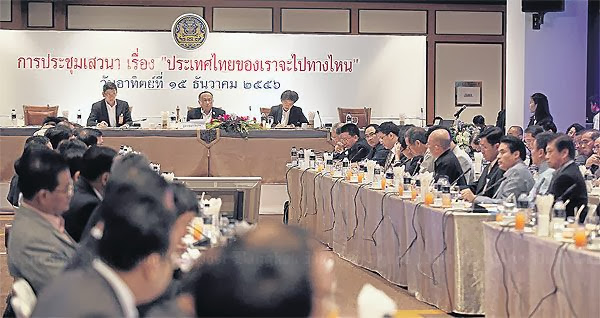 |
| CNRP supporters carrying Cambodian flags march in Phnom Penh, March 30, 2014. |
 |
| CNRP leaders Sam Rainsy and Kem Sokha address supporters outside the party headquarters, March 30, 2014. Photo credit: RFA. |
Two monks raise their arms in fear as a military police officer raises a baton to strike them on Saturday morning in Phnom Penh's Freedom Park.

Representatives from state agencies, political parties, civil groups and the private sector discuss solutions to the political impasse at the government’s national reform forum held yesterday at the Queen Sirikit Convention Centre. PATTANAPONG HIRUNARD

South Korea's president has warned of possible "reckless provocations" by the North, following the shock execution of leader Kim Jong-un's uncle.

Chinese policemen on patrol in this file photo taken in Kashgar, a city in China's volatile western region of Xinjiang.

The stadium will host England's opening match of the 2014 World Cup

The female condom flopped when it was launched some 20 years ago, but it never disappeared entirely and now a number of companies are entering the fray with new products. Could its time have come?

Protesters who marched along different routes across the city flood into the streets around Government House. SITHIKORN WONGWUDTHIANUN
.jpg)
Opposition leader Sam Rainsy is greeted by supporters at Phnom Penh International Airport after returning from a trip to Europe. Heng Chivoan

Local and Worldwide Reservation such as: Tour,Visa,Air Tiecket,Hotel,Tranportation Rental,Passport,Living Abroad, Trip Abroad,Domestic Bus/Boat ticket Reservation,Travel Insurance,Official Translation,Postage and Shipping

The entrance gate to Orkas Knhom facility on the outskirts of Cambodia’s capital Phnom Penh this year. PHOTO SUPPLIED

Thai PM Yingluck to dissolve parliament and call elections

A lady places freshly caught fish out on a drying rack in Phnom Penh’s Chraing Chamreh commune yesterday. Hong Menea

 4/07/2014 09:31:00 AM
4/07/2014 09:31:00 AM
 Unknown
Unknown
 |
| CNRP supporters carrying Cambodian flags march in Phnom Penh, March 30, 2014. |
 |
| CNRP leaders Sam Rainsy and Kem Sokha address supporters outside the party headquarters, March 30, 2014. Photo credit: RFA. |
 3/30/2014 09:41:00 AM
3/30/2014 09:41:00 AM
 Unknown
Unknown
 | |
| Cambodian Prime Minister Hun Sen addresses the inauguration ceremony of a hydropower plant in Pursat province, March 27, 2014. |
 3/19/2014 10:36:00 AM
3/19/2014 10:36:00 AM
 Unknown
Unknown
 | |
| Bopha waits for customers at a park near the waterfront in Phnom Penh, March 2014. |
 |
| Children play in front of homes at the resettlement site in Phnom Bat, March 2014. Photo credit: RFA. |
 3/16/2014 09:09:00 AM
3/16/2014 09:09:00 AM
 Unknown
Unknown
 |
| Striking garment workers demonstrate in Phnom Penh, Dec. 31, 2013. |
 3/14/2014 03:29:00 PM
3/14/2014 03:29:00 PM
 Unknown
Unknown
 | ||
| Binh Chhin (L) speaks to reporters in response to Son Chhay (R) in Phnom Penh, March, 10, 2014. |
 3/13/2014 09:34:00 AM
3/13/2014 09:34:00 AM
 Unknown
Unknown
 | ||
| CNRP President Sam Rainsy (left) and his deputy Kem Sokha (right) wave to supporters at a protest in Phnom Penh, March 8, 2014. |
 3/05/2014 02:05:00 PM
3/05/2014 02:05:00 PM
 Unknown
Unknown
 | ||
| Hun Sen chairs the Cambodia Outlook Conference in Phnom Penh, Feb. 27, 2014. |



